XFX’s Radeon HD 7970 Black Edition Double Dissipation: The First Semi-Custom 7970
by Ryan Smith on January 9, 2012 6:00 AM ESTOverclocking
Though XFX does not provide any overclocking tools for the BEDD, the card itself is advertised as an overclocking card to an extent. The use of the AMD PCB and a similarly high performing cooler means that overclocking results shouldn’t be much better or much worse than reference cards, but given how much potential we’re seeing out of the 7970 this is not a bad thing.
Even with XFX’s factory overclock the BEDD features the same 1125MHz overdrive limit as all current 7970 cards, so you have 125MHz (~11%) to play with within Overdrive. Based on our experience this is right at the edge of what’s this card is capable of – after pushing the card to 1150MHz through MSI’s Afterburner software we found that our sample peaked at 1125MHz anyhow, as anything beyond that impacted stability and caused artifacts. Meanwhile we were able to push our memory to 6.3GHz, as beyond that point performance plateaued as the need for error correction nullified our gains.
Our final clocks were 1125MHz core and 6.3GHz memory, representing a 21% core and 14% memory overclock over the reference 7970, or an 11% core and 11% memory overclock over XFX’s factory overclock. As the BEDD uses an AMD PCB it should be possible to use compatible voltage tweaking software to push it further, but for the time being we’re limiting ourselves to what the 7970 can do on stock voltage as the AMD PCB isn’t particularly overbuilt for overvolting. On that note we did increase our PowerTune limit to +20% (300W) in order to ensure PowerTune didn’t throttle our overclocked BEDD, though there appears to be headroom to spare in at least some of our games.
| Radeon HD 7970 Overclocking | |||||
| Radeon HD 7970 Stock | XFX Radeon HD 7970 BEDD | XFX Radeon HD 7970 BEDD Overclock | |||
| Core Clock | 925MHz | 1000MHz | 1125MHz | ||
| Memory Clock | 1.375GHz (5.5GHz effective) GDDR5 | 1.425GHz (5.7GHz effective) GDDR5 | 1.575GHz (6.3GHz effective) GDDR5 | ||
| Voltage | 1.17v | 1.17v | 1.17v | ||
| PowerTune | 250W | 250W | 300W | ||
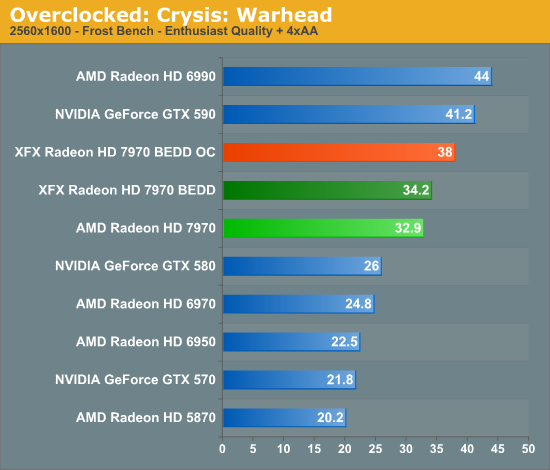
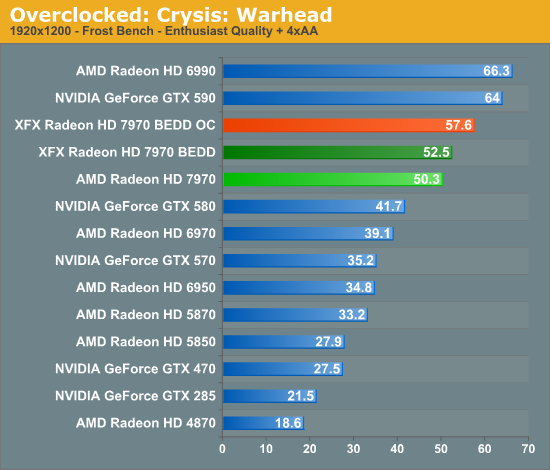
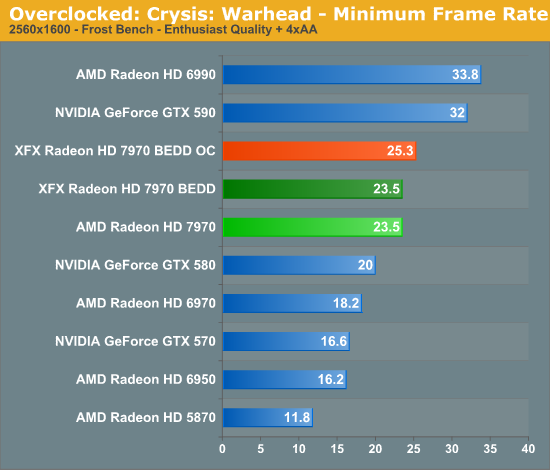
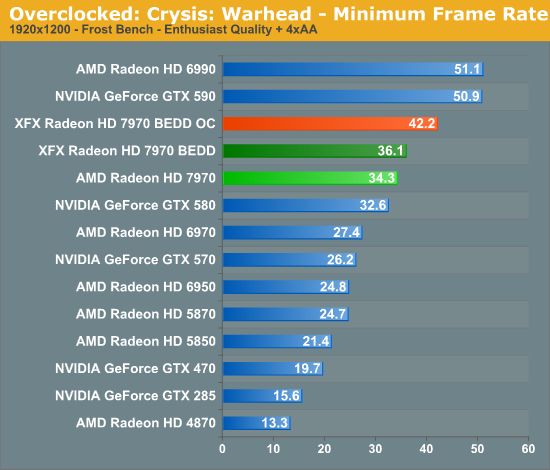
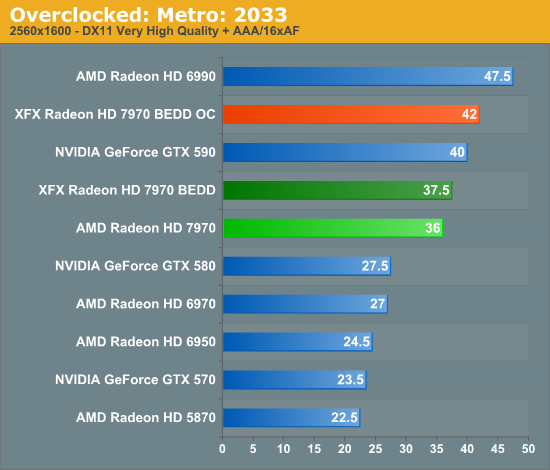
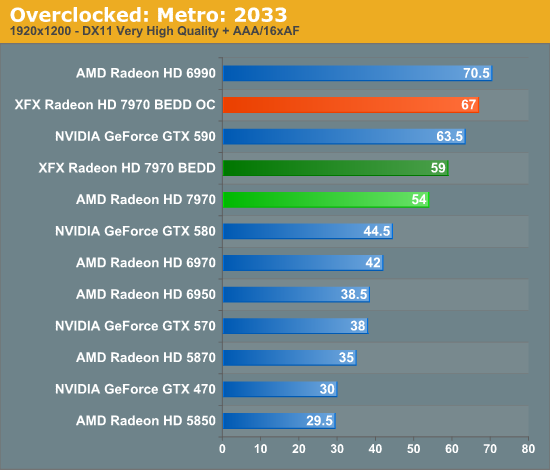
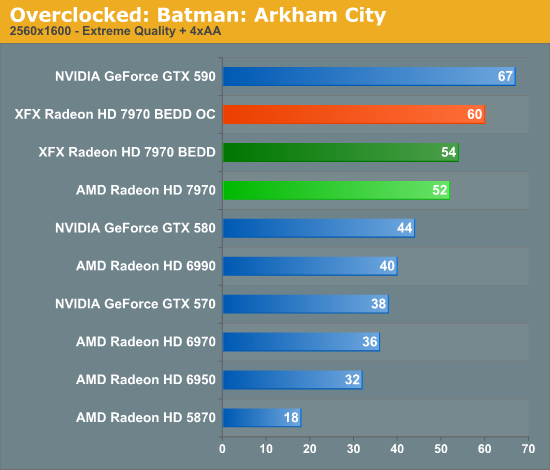
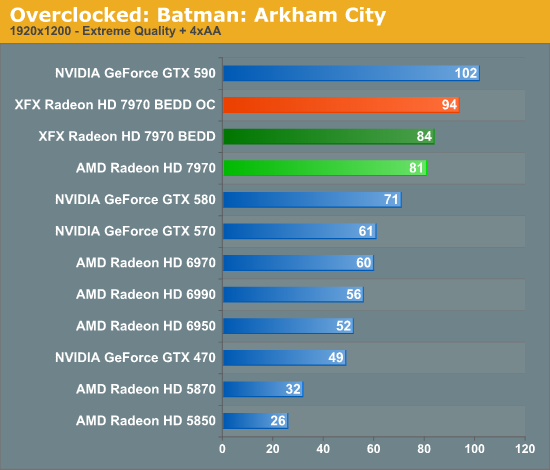
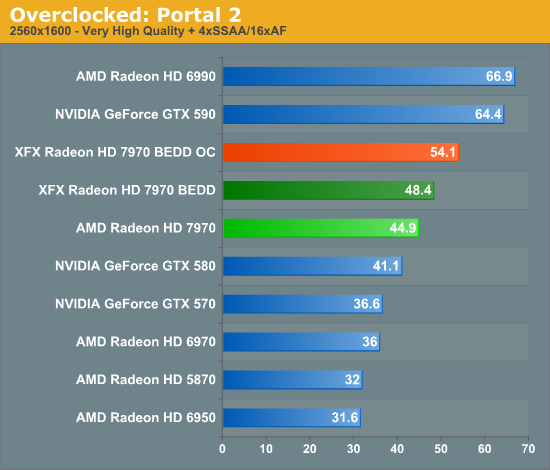
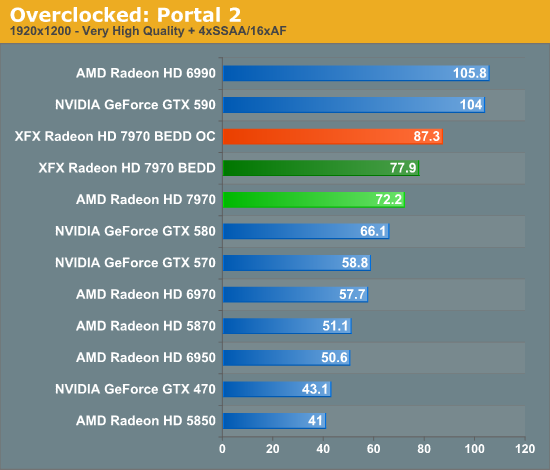
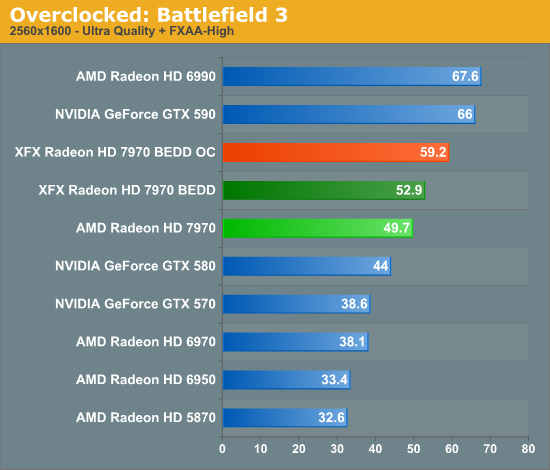
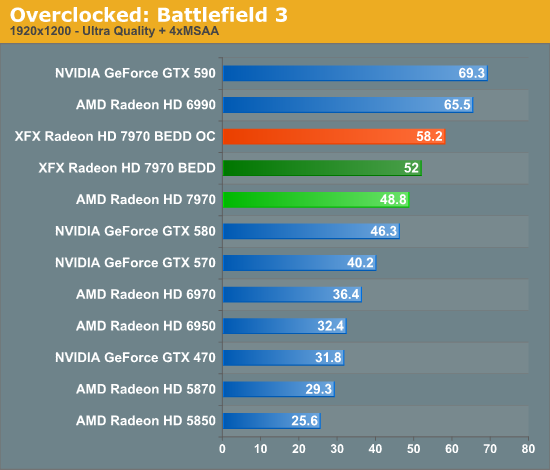
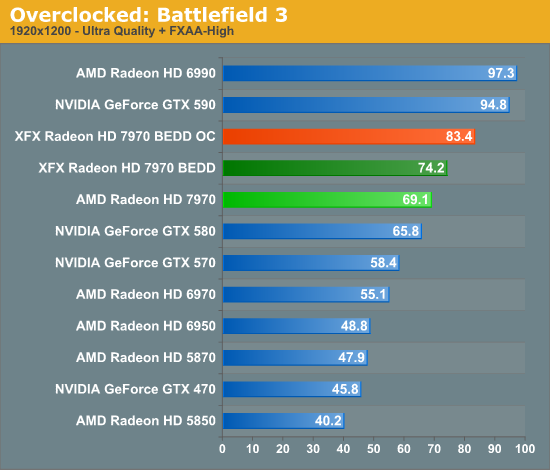
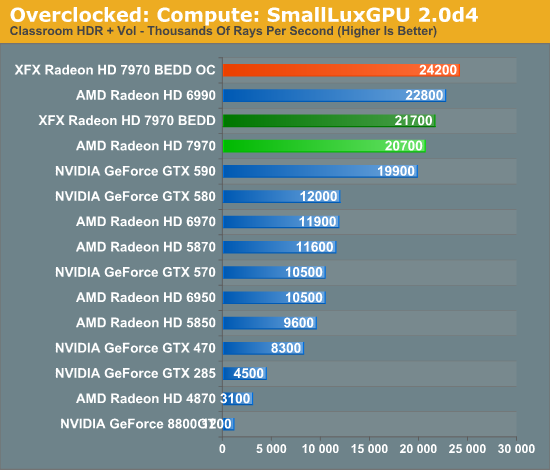
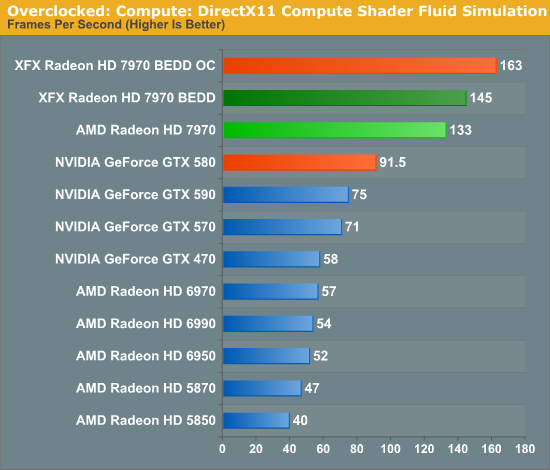
The end result of a further 11% overclock to both the GPU and memory clock results in a very consistent 11% performance increase across the board. From Crysis to Battlefield 3 everything jumps up by 11%, and the combination of the two overclocks means that our overclocked BEDD leaves just about every other single-GPU video card in the dust. Even the dual-GPU 6990 and GTX 590 have their leads seriously eroded, and in a few cases the overclocked BEDD will pull ahead of the GTX 590 in games that AMD does particularly well in. If the reference 7970 and BEDD didn’t impress you, certainly this will.
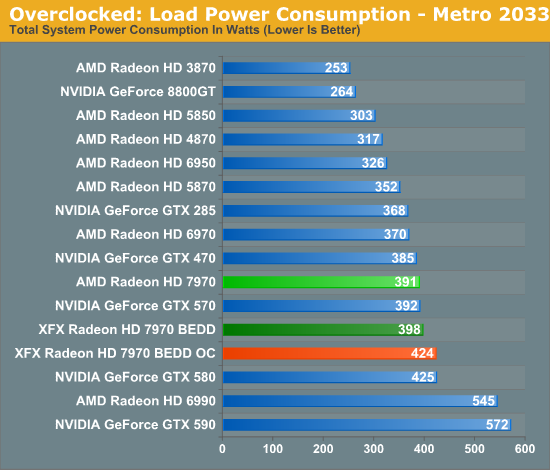
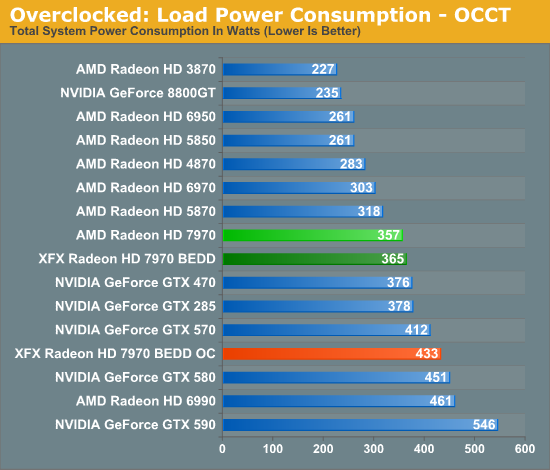
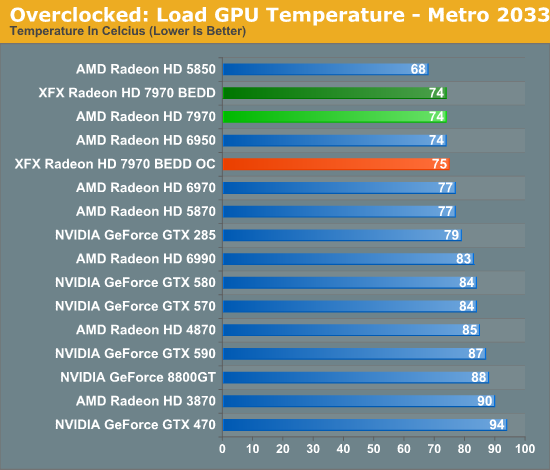
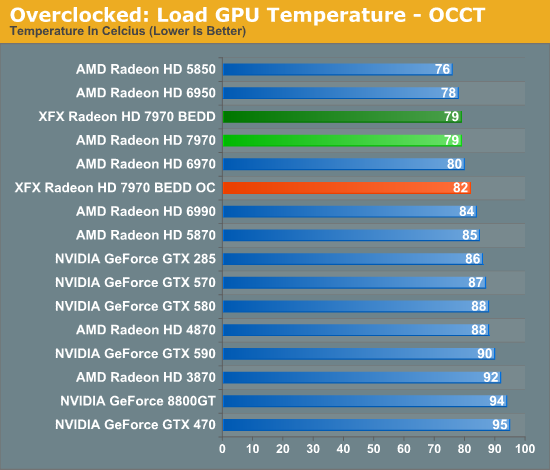
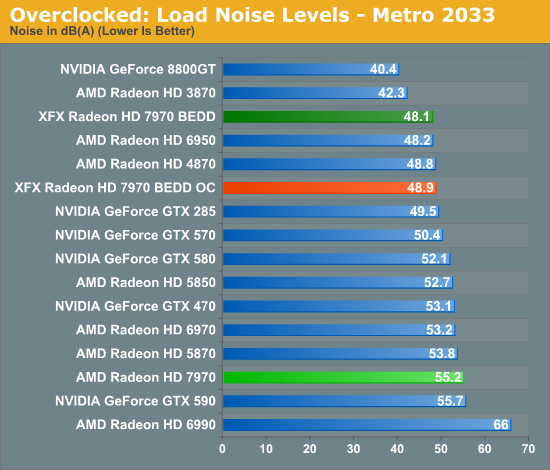
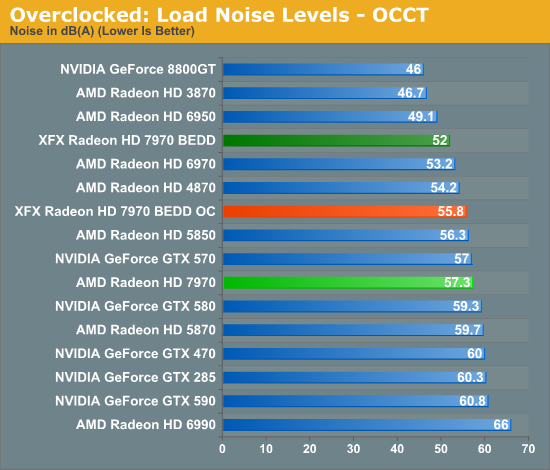
So what’s the tradeoff for this overclock? It’s actually very little. Even with our increased PowerTune limit – which doesn’t increase the power consumption, just the potential for power consumption – power consumption under Metro only rises 26W, and at least some of this will be additional work on the CPU in response to the relaxed GPU bottleneck. OCCT looks worse, but again this has more to do with the PowerTune limit than the overclock.
The fact that this overclock has had a minimal impact on the power consumption of our BEDD is reinforced by our temperature and noise data. Under Metro the overclocked BEDD gets 1C warmer and 2dB louder versus its factory clocks, which is a very small increase given the 11% overclock. So long as we don’t touch the core voltage for the BEDD (or any other 7970), the power tradeoff for overclocking is nearly non-existent, which is fantastic news given that we’ve just driven a 7970 21% over AMD’s reference clocks on reference voltage.










93 Comments
View All Comments
FaaR - Monday, January 9, 2012 - link
It's a lot more than 6% faster, don't be such a ridiculous fanboy.It also draws a lot less power than a 580, saving back (some) of the price difference in the long run as a lower electricity bill.
wonderpookie - Monday, January 9, 2012 - link
What's a "pre-binned" card?Thanks! :)
Rick83 - Monday, January 9, 2012 - link
A card which has been tested to have tighter tolerances (in this case) than others and has been selected with this in mind.Technically "pre-binned" is not a very sensible word creation, as the "pre" refers to the fact that it is done by the manufacturer and not the end-user-over-clocker -- but these days more people by manufacturer over-clocked cards than there are people that actually buy a dozen cards, test them all for the highest achievable OC, and then resell/send back the less stable cards.
Morg. - Monday, January 9, 2012 - link
binning : the process of separating *PU's according to their maximum operating frequency.Called like that because you would test all your GPU's and put all those between 1200-1300 mhz stable @ xyz volts in bin 1, all those between 1100-1200 in bin 2, etc. in order to present differentiated offerings.
In the past, many CPU part numbers were just different binnings of the same part (like C2D 2.33 or 2.4 ghz etc.), same goes for GPU's, and AMD even introduced a different kind of binning with their x2,x3,x4 variants based on how many cores were stable at the target speed, and locking those that weren't (x2s were quickly made from x2 parts, and then x1 (sempron) selected from failed x2s).
So in this case, it would mean XFX tested the cards and selected the better performers to sell as DDBE, leaving the others for non-overclocked cards.
This works that way because no CPU or GPU is perfect and all dies are more or less failed prints of the actual design.
The most flawed cannot be used at all and go to the trash.
The slightly flawed get some parts of the die disconnected (faulty cache, broken core, ...).
The slightly less flawed just get overvolted / underclocked in order to run.
The best parts come closer to the intended result and will thus operate at lower voltages or higher frequencies in comparison.
Usually, binning isn't perfect and some better dies can fall in lower bins, hence the unlockable cores on older phenom/sempron x2,x3, etc. -
It is also not as fine-grained as some pro OCers would like it to be, and because of that, they tend to buy a bunch of CPU's and bin them themselves in order to break WR's (look at kingpincooling.com).
Iketh - Monday, January 9, 2012 - link
"However it’s interesting to note that temperatures under load end up being identical to the reference 7970. The BEDD is no cooler than the reference 7970 even with its radically different cooling apparatus. This is ultimately a result of the fact that the BEDD is a semi-custom card; not only is XFX using AMD’s PCB, but they’re using AMD’s aggressive fan profile. At any given temperature the BEDD’s fans ramp up to the same speed (as a percentage) as AMD’s fans, meaning that the BEDD’s fans won’t ramp up until the card hits the same temperatures that trigger a ramp-up on the reference design. As a result the BEDD is no cooler than the reference 7970, though with AMD’s aggressive cooling policy the reference 7970 would be tough to beat."You do realize overclocking increases temps, right? Even if voltages aren't touched.
NJoy - Monday, January 9, 2012 - link
have you tried to understand what is written in the bit you copypasted?Iketh - Tuesday, January 10, 2012 - link
Sorry, but it's you that isn't understanding. My point is that I believe the cooler to be 2-4C cooler than the reference considering it's holding the same temps with an overclock. That's all.Morg. - Monday, January 9, 2012 - link
Very true ...But this is Anandtech ;)
-- mainstream tech news for the masses
It's like their new config advice .. every config they advise is at least 10% pure waste of cash .. but it's still better than no advice for those who don't know better.
And furthermore, the temperature points are simply a result of what XFX wanted for this card. nothing else.
AMD's fan profile is part of that but you can rewrite it in the BIOS iirc so they just didn't bother / their fans don't run reliably below voltage xyz.
I could mod that card to make it silent, so could XFX, they just didn't want to go into such detail when they could simply slap their cooler on it, change clocks and ship it - all there is to it.
B3an - Monday, January 9, 2012 - link
WTF are you on about you stupid little kid. Many of Anand's articles on here are unrivalled for technical details and insight.Morg. - Tuesday, January 10, 2012 - link
lol .And you would know ... with a fake 1337speak nick ... if you think they're so good it only goes to show your ignorance makes anandtech a perfect fit for you, a fact I was pointing to in the post you replied to.
At your level of understanding, Anandtech is a perfect fit.
Good for Anand and for you tbh . enjoy it.